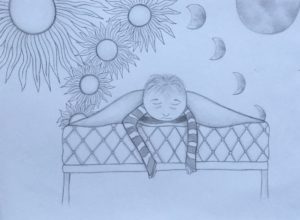
Lilly Klontz, age 16, from OK, created this artwork in response to a contest prompt asking participants to depict how having ME/CFS makes people feel.
What is ME/CFS?
Myalgic encephalomyelitis/chronic fatigue syndrome (ME/CFS) is a serious, long-term illness. People with ME/CFS are often not able to do their usual activities. At times, ME/CFS may confine them to bed. People with ME/CFS have severe fatigue and sleep problems. ME/CFS may get worse after people with the illness try to do as much as they want or need to do. This symptom is known as post-exertional malaise (PEM). Other symptoms can include problems with thinking and concentrating, pain, and dizziness. According to an Institute of Medicine (IOM) report published in 2015, an estimated 836,000 to 2.5 million Americans suffer from ME/CFS, but most of them have not been diagnosed. ME/CFS is often thought of as a problem in adults, but children (both adolescents and younger children) can also get ME/CFS.
A CPIR collaborative with the CFSAC, CDC, and DOE
On the recommendation of the Chronic Fatigue Syndrome Advisory Committee (CFSAC) of the U.S. Department of Health and Human Services, the Centers for Disease Control and Prevention (CDC) and the U.S. Department of Education (DOE) have collaborated to disseminate information about Pediatric Myalgic Encephalomyelitis/Chronic Fatigue Syndrome (ME/CFS) to all Parent Training and Information Centers (PTIs). The CPIR is pleased to provide web links to content in the pediatric section of the CDC’s ME/CFS website. The CDC’s website also currently features web links to CPIR and DOE resources that might be helpful to patients with ME/CFS and their families. Some of the agencies’ resources are included below.
CDC Fact Sheets for Parents/Guardians, Education, and Healthcare Professionals
- Fact Sheet for Parents/Guardians
- Fact Sheet for Education Professionals
- Fact Sheet for Healthcare Professionals
U.S. Department of Education Resources on IDEA and Section 504
CPIR Information and Resources
- What is the Individuals with Disabilities Education Act (IDEA)?
- Categories of Disability Under IDEA
- Other Health Impairments Fact Sheet: Note: ME/CFS could fall under the category of Other Health Impairments Not Mentioned in IDEA’s Definition within the 14 categories of disability listed under IDEA.
- Overview of the Individualized Education Plan (IEP)
- Section 504 of the Rehabilitation Act of 1973
- Find Your State’s Parent Center: Get help finding the appropriate support and resources in your area to meet your child’s needs.







